Business and Tourism Management: Ethical Considerations and Success
VerifiedAdded on 2023/01/19
|14
|3212
|59
Report
AI Summary
This report provides an in-depth analysis of the ethical considerations that significantly impact organizational operations and success, focusing on the Sackler family case. The case study highlights the adverse effects of unethical practices, such as the promotion and sale of addictive drugs, on a company's reputation and brand value, even when donations are made to public institutions. The analysis explores three key themes: the impact of unethical behavior on reputation and success, the role of public perspective, and the influence of ethical conduct on regulatory compliance and service quality. The report recommends that organizations prioritize ethical practices to maintain a strong reputation and brand value, emphasizing the integration of ethics into operational practices for long-term success. It concludes that ethical considerations are crucial for achieving desired business goals and maintaining a positive public image, ensuring customer trust and meeting regulatory standards. The report also emphasizes the importance of transparency and ethical audits for organizations receiving donations from external sources.
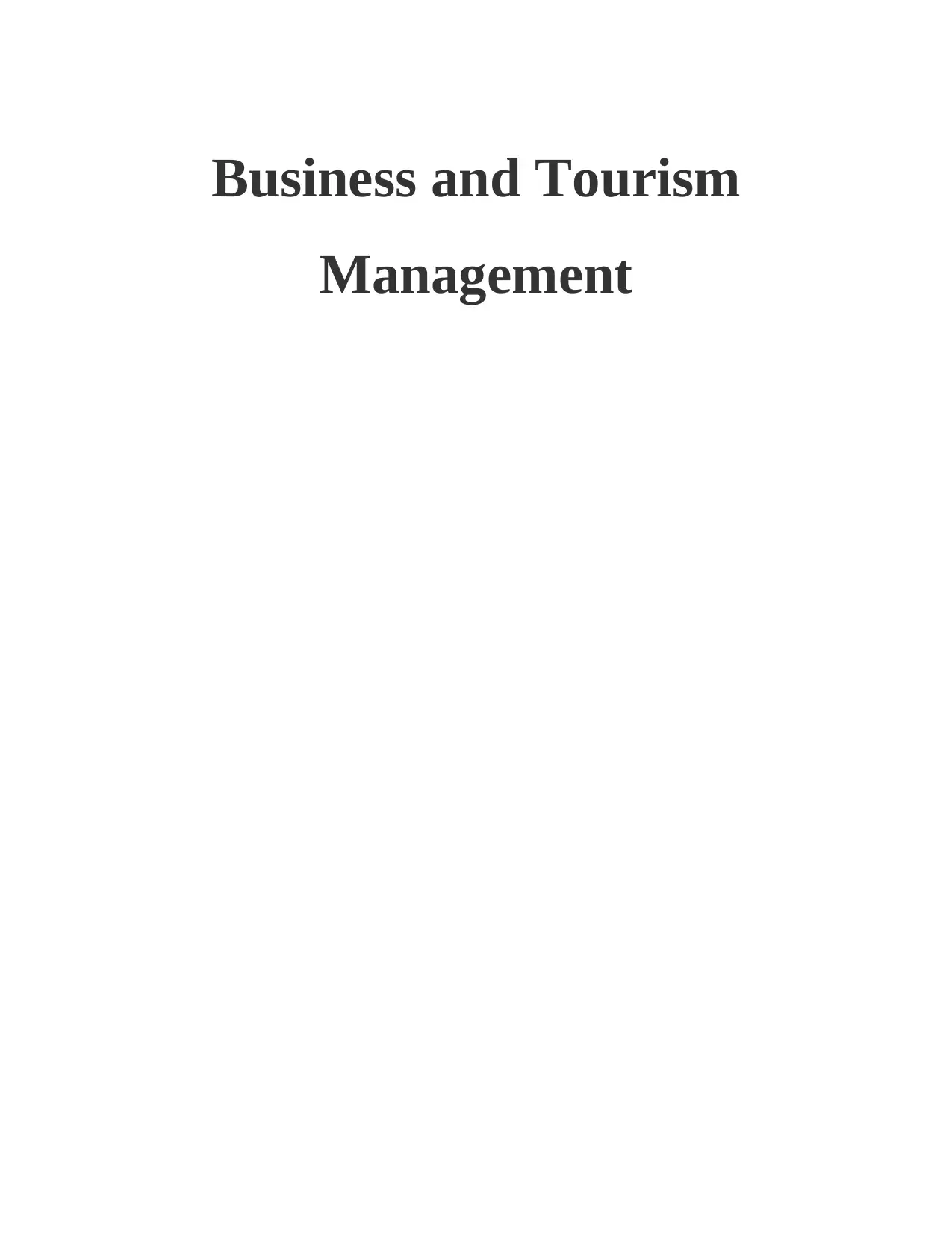
Business and Tourism
Management
Management
Paraphrase This Document
Need a fresh take? Get an instant paraphrase of this document with our AI Paraphraser
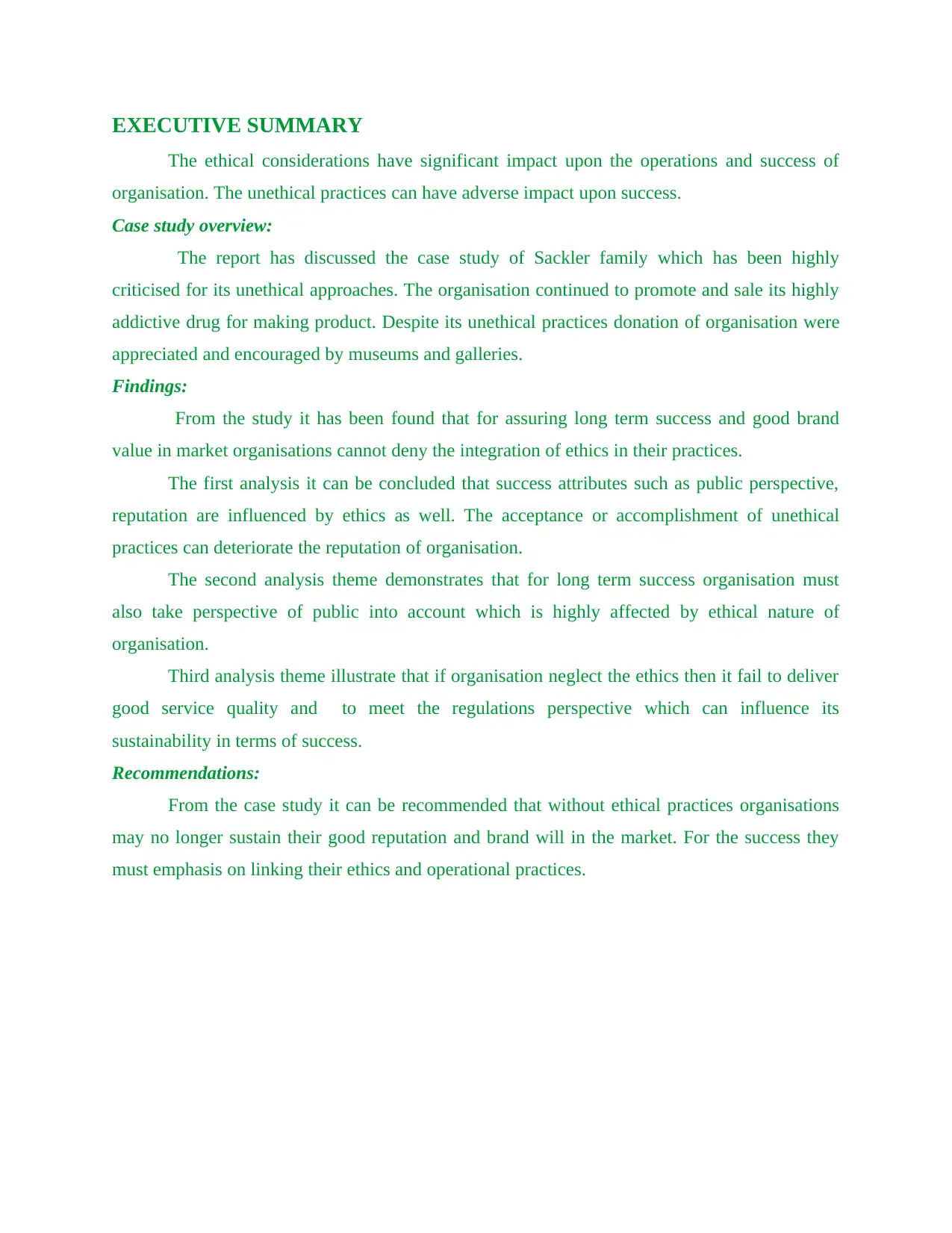
EXECUTIVE SUMMARY
The ethical considerations have significant impact upon the operations and success of
organisation. The unethical practices can have adverse impact upon success.
Case study overview:
The report has discussed the case study of Sackler family which has been highly
criticised for its unethical approaches. The organisation continued to promote and sale its highly
addictive drug for making product. Despite its unethical practices donation of organisation were
appreciated and encouraged by museums and galleries.
Findings:
From the study it has been found that for assuring long term success and good brand
value in market organisations cannot deny the integration of ethics in their practices.
The first analysis it can be concluded that success attributes such as public perspective,
reputation are influenced by ethics as well. The acceptance or accomplishment of unethical
practices can deteriorate the reputation of organisation.
The second analysis theme demonstrates that for long term success organisation must
also take perspective of public into account which is highly affected by ethical nature of
organisation.
Third analysis theme illustrate that if organisation neglect the ethics then it fail to deliver
good service quality and to meet the regulations perspective which can influence its
sustainability in terms of success.
Recommendations:
From the case study it can be recommended that without ethical practices organisations
may no longer sustain their good reputation and brand will in the market. For the success they
must emphasis on linking their ethics and operational practices.
The ethical considerations have significant impact upon the operations and success of
organisation. The unethical practices can have adverse impact upon success.
Case study overview:
The report has discussed the case study of Sackler family which has been highly
criticised for its unethical approaches. The organisation continued to promote and sale its highly
addictive drug for making product. Despite its unethical practices donation of organisation were
appreciated and encouraged by museums and galleries.
Findings:
From the study it has been found that for assuring long term success and good brand
value in market organisations cannot deny the integration of ethics in their practices.
The first analysis it can be concluded that success attributes such as public perspective,
reputation are influenced by ethics as well. The acceptance or accomplishment of unethical
practices can deteriorate the reputation of organisation.
The second analysis theme demonstrates that for long term success organisation must
also take perspective of public into account which is highly affected by ethical nature of
organisation.
Third analysis theme illustrate that if organisation neglect the ethics then it fail to deliver
good service quality and to meet the regulations perspective which can influence its
sustainability in terms of success.
Recommendations:
From the case study it can be recommended that without ethical practices organisations
may no longer sustain their good reputation and brand will in the market. For the success they
must emphasis on linking their ethics and operational practices.
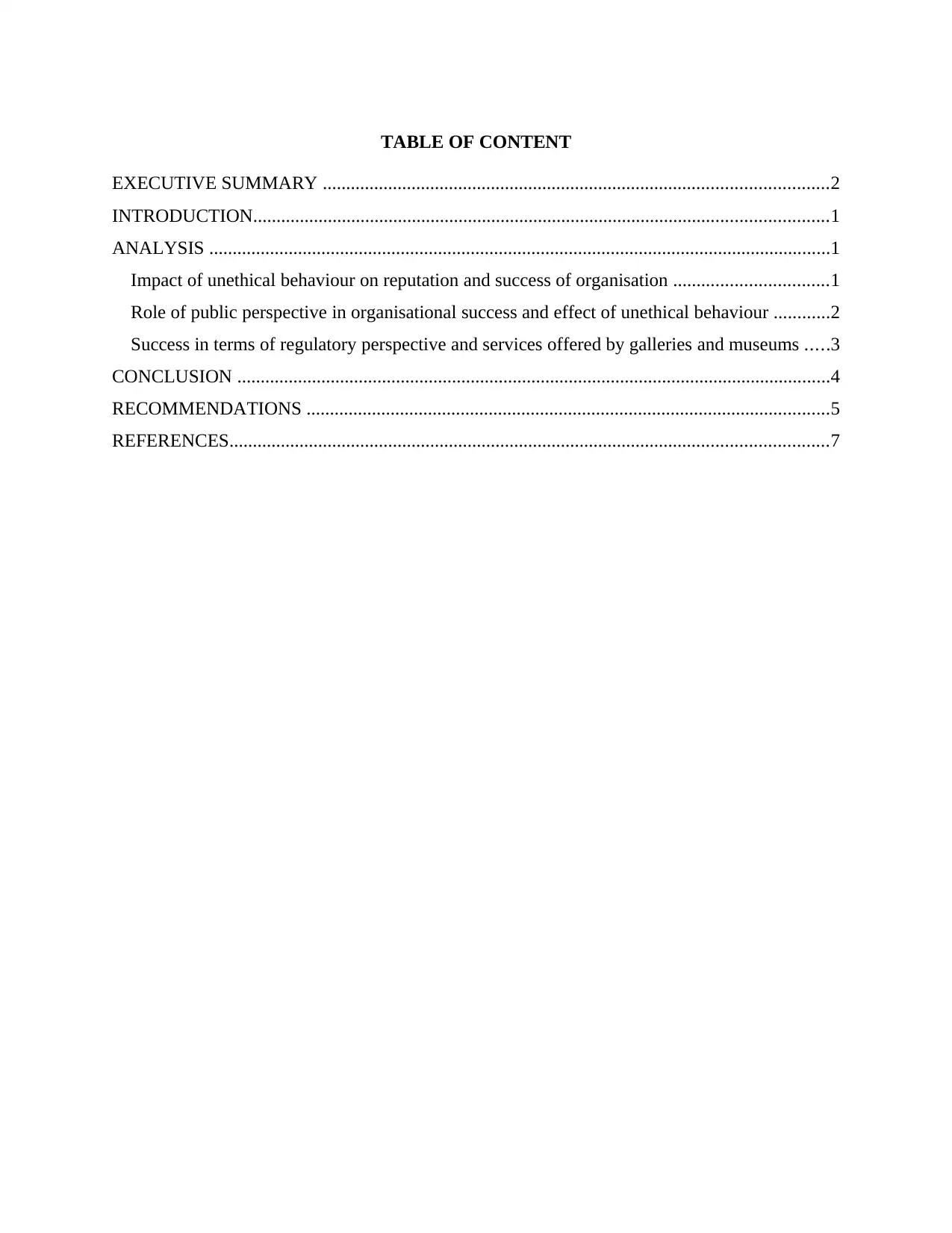
TABLE OF CONTENT
EXECUTIVE SUMMARY ............................................................................................................2
INTRODUCTION...........................................................................................................................1
ANALYSIS .....................................................................................................................................1
Impact of unethical behaviour on reputation and success of organisation .................................1
Role of public perspective in organisational success and effect of unethical behaviour ............2
Success in terms of regulatory perspective and services offered by galleries and museums .....3
CONCLUSION ...............................................................................................................................4
RECOMMENDATIONS ................................................................................................................5
REFERENCES................................................................................................................................7
EXECUTIVE SUMMARY ............................................................................................................2
INTRODUCTION...........................................................................................................................1
ANALYSIS .....................................................................................................................................1
Impact of unethical behaviour on reputation and success of organisation .................................1
Role of public perspective in organisational success and effect of unethical behaviour ............2
Success in terms of regulatory perspective and services offered by galleries and museums .....3
CONCLUSION ...............................................................................................................................4
RECOMMENDATIONS ................................................................................................................5
REFERENCES................................................................................................................................7
⊘ This is a preview!⊘
Do you want full access?
Subscribe today to unlock all pages.

Trusted by 1+ million students worldwide
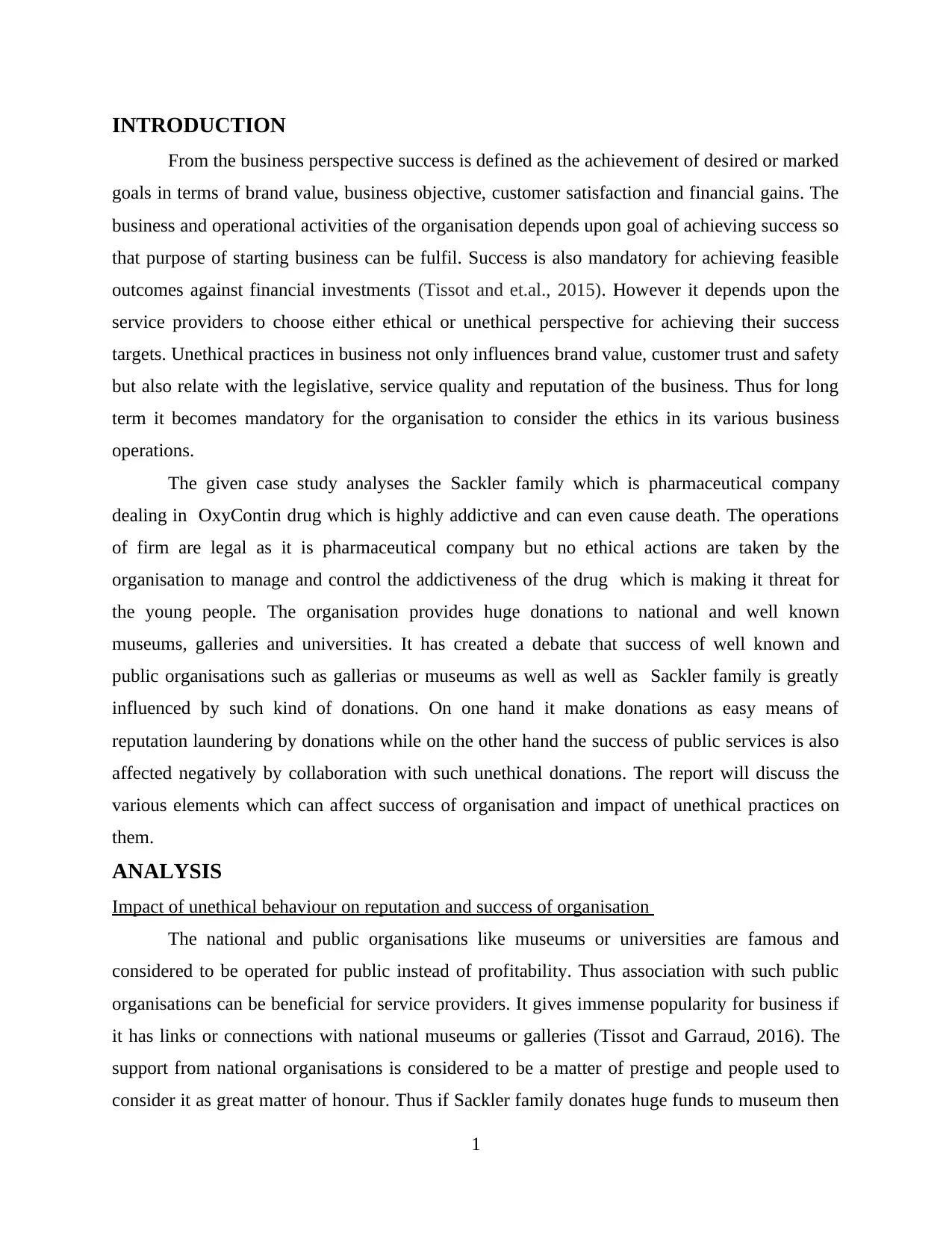
INTRODUCTION
From the business perspective success is defined as the achievement of desired or marked
goals in terms of brand value, business objective, customer satisfaction and financial gains. The
business and operational activities of the organisation depends upon goal of achieving success so
that purpose of starting business can be fulfil. Success is also mandatory for achieving feasible
outcomes against financial investments (Tissot and et.al., 2015). However it depends upon the
service providers to choose either ethical or unethical perspective for achieving their success
targets. Unethical practices in business not only influences brand value, customer trust and safety
but also relate with the legislative, service quality and reputation of the business. Thus for long
term it becomes mandatory for the organisation to consider the ethics in its various business
operations.
The given case study analyses the Sackler family which is pharmaceutical company
dealing in OxyContin drug which is highly addictive and can even cause death. The operations
of firm are legal as it is pharmaceutical company but no ethical actions are taken by the
organisation to manage and control the addictiveness of the drug which is making it threat for
the young people. The organisation provides huge donations to national and well known
museums, galleries and universities. It has created a debate that success of well known and
public organisations such as gallerias or museums as well as well as Sackler family is greatly
influenced by such kind of donations. On one hand it make donations as easy means of
reputation laundering by donations while on the other hand the success of public services is also
affected negatively by collaboration with such unethical donations. The report will discuss the
various elements which can affect success of organisation and impact of unethical practices on
them.
ANALYSIS
Impact of unethical behaviour on reputation and success of organisation
The national and public organisations like museums or universities are famous and
considered to be operated for public instead of profitability. Thus association with such public
organisations can be beneficial for service providers. It gives immense popularity for business if
it has links or connections with national museums or galleries (Tissot and Garraud, 2016). The
support from national organisations is considered to be a matter of prestige and people used to
consider it as great matter of honour. Thus if Sackler family donates huge funds to museum then
1
From the business perspective success is defined as the achievement of desired or marked
goals in terms of brand value, business objective, customer satisfaction and financial gains. The
business and operational activities of the organisation depends upon goal of achieving success so
that purpose of starting business can be fulfil. Success is also mandatory for achieving feasible
outcomes against financial investments (Tissot and et.al., 2015). However it depends upon the
service providers to choose either ethical or unethical perspective for achieving their success
targets. Unethical practices in business not only influences brand value, customer trust and safety
but also relate with the legislative, service quality and reputation of the business. Thus for long
term it becomes mandatory for the organisation to consider the ethics in its various business
operations.
The given case study analyses the Sackler family which is pharmaceutical company
dealing in OxyContin drug which is highly addictive and can even cause death. The operations
of firm are legal as it is pharmaceutical company but no ethical actions are taken by the
organisation to manage and control the addictiveness of the drug which is making it threat for
the young people. The organisation provides huge donations to national and well known
museums, galleries and universities. It has created a debate that success of well known and
public organisations such as gallerias or museums as well as well as Sackler family is greatly
influenced by such kind of donations. On one hand it make donations as easy means of
reputation laundering by donations while on the other hand the success of public services is also
affected negatively by collaboration with such unethical donations. The report will discuss the
various elements which can affect success of organisation and impact of unethical practices on
them.
ANALYSIS
Impact of unethical behaviour on reputation and success of organisation
The national and public organisations like museums or universities are famous and
considered to be operated for public instead of profitability. Thus association with such public
organisations can be beneficial for service providers. It gives immense popularity for business if
it has links or connections with national museums or galleries (Tissot and Garraud, 2016). The
support from national organisations is considered to be a matter of prestige and people used to
consider it as great matter of honour. Thus if Sackler family donates huge funds to museum then
1
Paraphrase This Document
Need a fresh take? Get an instant paraphrase of this document with our AI Paraphraser
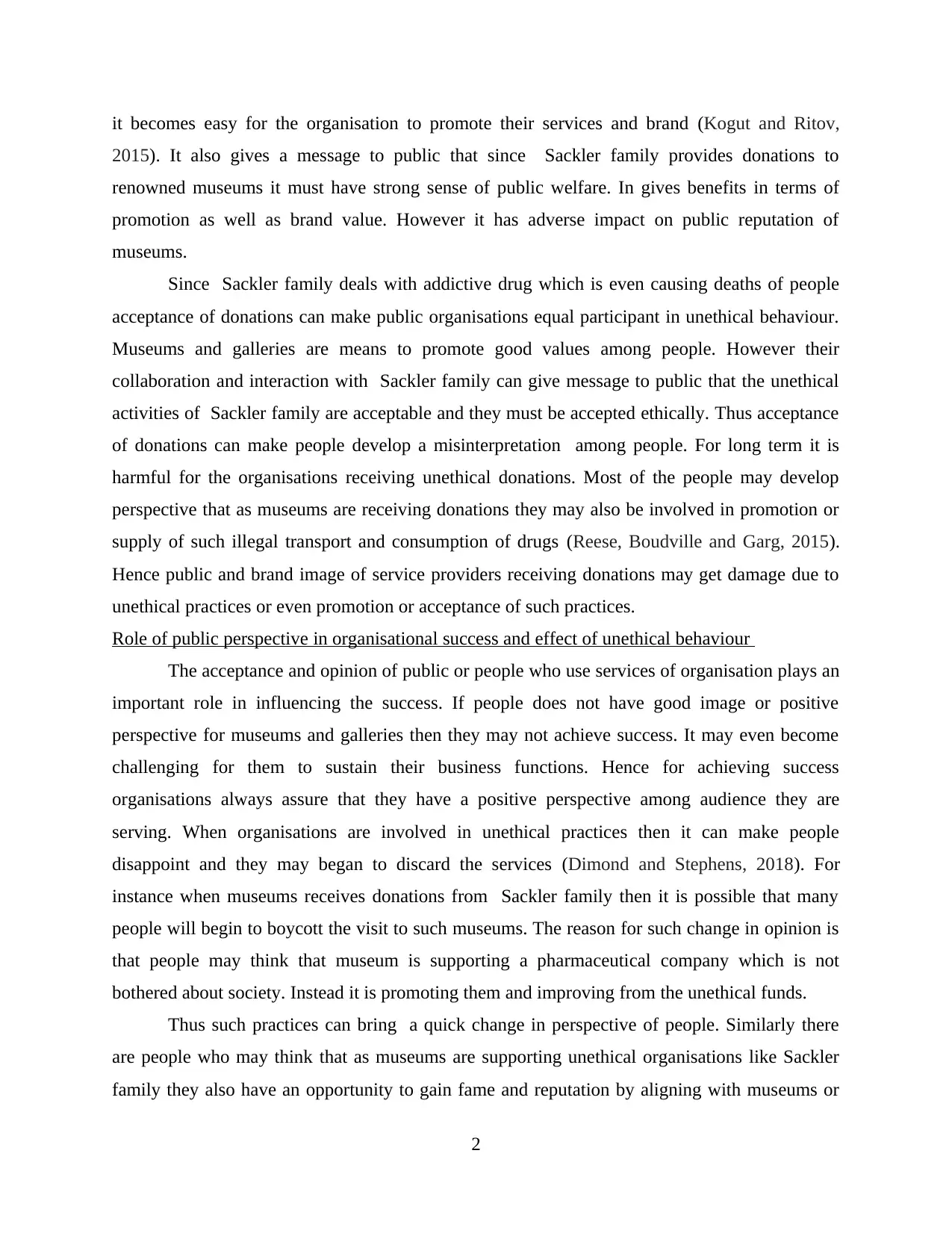
it becomes easy for the organisation to promote their services and brand (Kogut and Ritov,
2015). It also gives a message to public that since Sackler family provides donations to
renowned museums it must have strong sense of public welfare. In gives benefits in terms of
promotion as well as brand value. However it has adverse impact on public reputation of
museums.
Since Sackler family deals with addictive drug which is even causing deaths of people
acceptance of donations can make public organisations equal participant in unethical behaviour.
Museums and galleries are means to promote good values among people. However their
collaboration and interaction with Sackler family can give message to public that the unethical
activities of Sackler family are acceptable and they must be accepted ethically. Thus acceptance
of donations can make people develop a misinterpretation among people. For long term it is
harmful for the organisations receiving unethical donations. Most of the people may develop
perspective that as museums are receiving donations they may also be involved in promotion or
supply of such illegal transport and consumption of drugs (Reese, Boudville and Garg, 2015).
Hence public and brand image of service providers receiving donations may get damage due to
unethical practices or even promotion or acceptance of such practices.
Role of public perspective in organisational success and effect of unethical behaviour
The acceptance and opinion of public or people who use services of organisation plays an
important role in influencing the success. If people does not have good image or positive
perspective for museums and galleries then they may not achieve success. It may even become
challenging for them to sustain their business functions. Hence for achieving success
organisations always assure that they have a positive perspective among audience they are
serving. When organisations are involved in unethical practices then it can make people
disappoint and they may began to discard the services (Dimond and Stephens, 2018). For
instance when museums receives donations from Sackler family then it is possible that many
people will begin to boycott the visit to such museums. The reason for such change in opinion is
that people may think that museum is supporting a pharmaceutical company which is not
bothered about society. Instead it is promoting them and improving from the unethical funds.
Thus such practices can bring a quick change in perspective of people. Similarly there
are people who may think that as museums are supporting unethical organisations like Sackler
family they also have an opportunity to gain fame and reputation by aligning with museums or
2
2015). It also gives a message to public that since Sackler family provides donations to
renowned museums it must have strong sense of public welfare. In gives benefits in terms of
promotion as well as brand value. However it has adverse impact on public reputation of
museums.
Since Sackler family deals with addictive drug which is even causing deaths of people
acceptance of donations can make public organisations equal participant in unethical behaviour.
Museums and galleries are means to promote good values among people. However their
collaboration and interaction with Sackler family can give message to public that the unethical
activities of Sackler family are acceptable and they must be accepted ethically. Thus acceptance
of donations can make people develop a misinterpretation among people. For long term it is
harmful for the organisations receiving unethical donations. Most of the people may develop
perspective that as museums are receiving donations they may also be involved in promotion or
supply of such illegal transport and consumption of drugs (Reese, Boudville and Garg, 2015).
Hence public and brand image of service providers receiving donations may get damage due to
unethical practices or even promotion or acceptance of such practices.
Role of public perspective in organisational success and effect of unethical behaviour
The acceptance and opinion of public or people who use services of organisation plays an
important role in influencing the success. If people does not have good image or positive
perspective for museums and galleries then they may not achieve success. It may even become
challenging for them to sustain their business functions. Hence for achieving success
organisations always assure that they have a positive perspective among audience they are
serving. When organisations are involved in unethical practices then it can make people
disappoint and they may began to discard the services (Dimond and Stephens, 2018). For
instance when museums receives donations from Sackler family then it is possible that many
people will begin to boycott the visit to such museums. The reason for such change in opinion is
that people may think that museum is supporting a pharmaceutical company which is not
bothered about society. Instead it is promoting them and improving from the unethical funds.
Thus such practices can bring a quick change in perspective of people. Similarly there
are people who may think that as museums are supporting unethical organisations like Sackler
family they also have an opportunity to gain fame and reputation by aligning with museums or
2

other public organisations (Steele, Adcock and Steel, 2016). It will make elite and ethical
communities to develop a negative perspective for organisation.
Success in terms of regulatory perspective and services offered by galleries and museums
The donations form Sackler family made their active participation in decision making and
services of cultural institutions. From the donations museums and galleries have conducted a
good range of exhibitions. The huge donations and involvement of Sackler family affects the
various service attributes such as pricing, duration of exhibitions, promotional expenses and
other service factors (Ulph, 2015). However when these cultural institutions have association and
donation support from Sackler family and similar organisations facing legal suits related to
public health then it has adverse impact upon quality and perspective of services.
For instance when exhibitions are conducted from the donations of such influential
business groups then in such cases the promotional agenda of event is to promote organisation
giving donation. Thus the actual purpose of museum shifts to promote such organisations instead
of actually focusing on the artists or the purpose of exhibitions. The increasing role of Sackler
family by means of donations also influences the infrastructure, service range and quality offered
by the museums. Though it cannot be denied that donations are helpful in the development and
sustainability of cultural institutions but unethical behaviour can have negative impact on service
quality. The cultural institutes are means to encourage tourists and communities about the role of
art work and historical events or things.
However with acceptance and charity collaboration with Sackler family or similar
organisation museums used to promote unethical products or services. If exhibitions are
conducted by donations then it will involve promotion of Sackler family. As a result of this
many young people and community members will be misguided that services and product of
Sackler family are useful because reputed cultural institutions are promoting them. It is also
possible that with huge donations such donors also get indirect control in the activities and
service quality (Yasmin and Haniffa, 2017). This can prohibit people from using the services
provided by cultural institution. It can result in decline profitability and service users which is
harmful for achieving profitability goals of such institutions.
It has been analysed that in the Sackler family's case the ethical and legal aspects have
not been fully taken into consideration. Thus from regulatory perspective success of cultural
institutions seems to be questionable. For the institutions receiving donations it is mandatory to
3
communities to develop a negative perspective for organisation.
Success in terms of regulatory perspective and services offered by galleries and museums
The donations form Sackler family made their active participation in decision making and
services of cultural institutions. From the donations museums and galleries have conducted a
good range of exhibitions. The huge donations and involvement of Sackler family affects the
various service attributes such as pricing, duration of exhibitions, promotional expenses and
other service factors (Ulph, 2015). However when these cultural institutions have association and
donation support from Sackler family and similar organisations facing legal suits related to
public health then it has adverse impact upon quality and perspective of services.
For instance when exhibitions are conducted from the donations of such influential
business groups then in such cases the promotional agenda of event is to promote organisation
giving donation. Thus the actual purpose of museum shifts to promote such organisations instead
of actually focusing on the artists or the purpose of exhibitions. The increasing role of Sackler
family by means of donations also influences the infrastructure, service range and quality offered
by the museums. Though it cannot be denied that donations are helpful in the development and
sustainability of cultural institutions but unethical behaviour can have negative impact on service
quality. The cultural institutes are means to encourage tourists and communities about the role of
art work and historical events or things.
However with acceptance and charity collaboration with Sackler family or similar
organisation museums used to promote unethical products or services. If exhibitions are
conducted by donations then it will involve promotion of Sackler family. As a result of this
many young people and community members will be misguided that services and product of
Sackler family are useful because reputed cultural institutions are promoting them. It is also
possible that with huge donations such donors also get indirect control in the activities and
service quality (Yasmin and Haniffa, 2017). This can prohibit people from using the services
provided by cultural institution. It can result in decline profitability and service users which is
harmful for achieving profitability goals of such institutions.
It has been analysed that in the Sackler family's case the ethical and legal aspects have
not been fully taken into consideration. Thus from regulatory perspective success of cultural
institutions seems to be questionable. For the institutions receiving donations it is mandatory to
3
⊘ This is a preview!⊘
Do you want full access?
Subscribe today to unlock all pages.

Trusted by 1+ million students worldwide
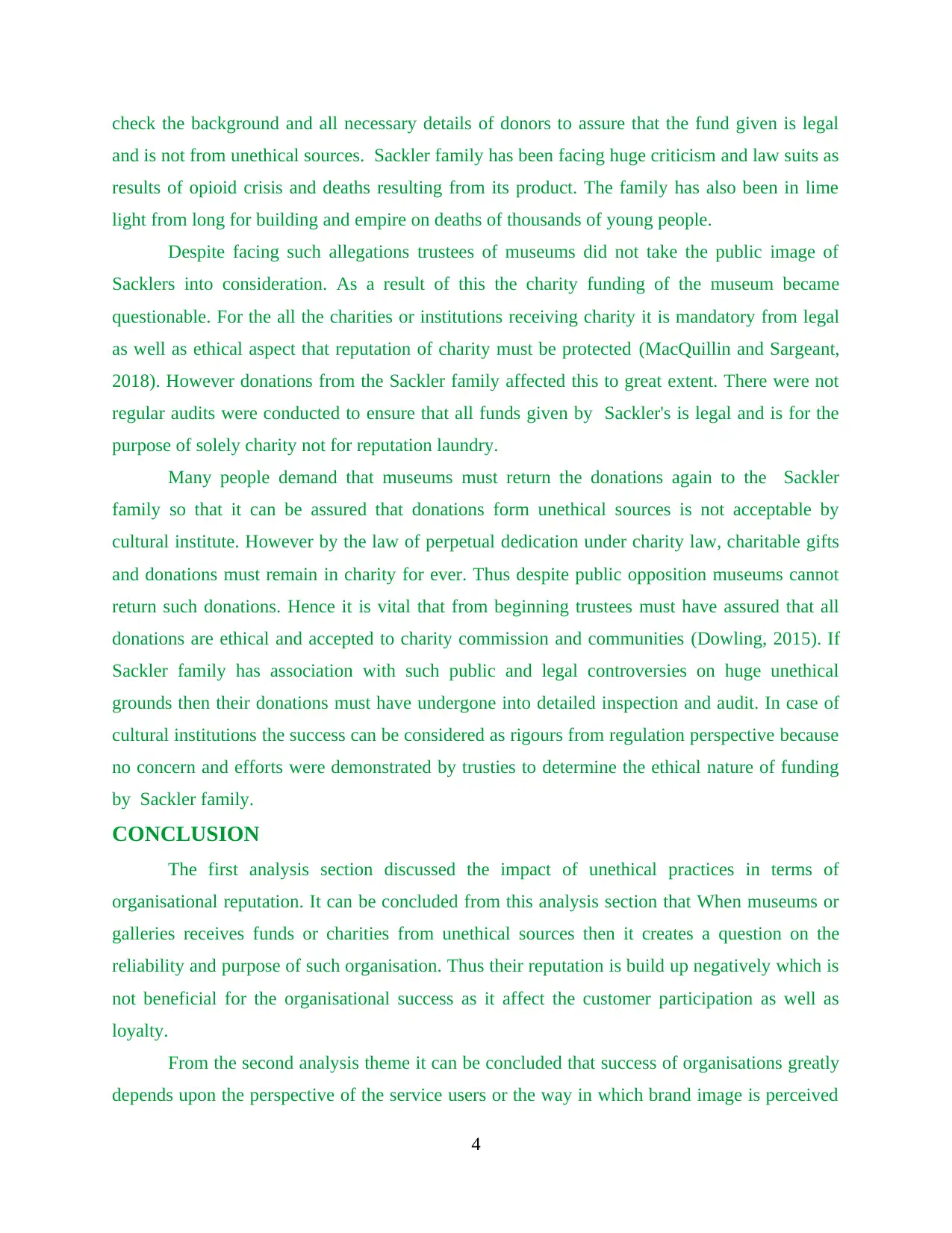
check the background and all necessary details of donors to assure that the fund given is legal
and is not from unethical sources. Sackler family has been facing huge criticism and law suits as
results of opioid crisis and deaths resulting from its product. The family has also been in lime
light from long for building and empire on deaths of thousands of young people.
Despite facing such allegations trustees of museums did not take the public image of
Sacklers into consideration. As a result of this the charity funding of the museum became
questionable. For the all the charities or institutions receiving charity it is mandatory from legal
as well as ethical aspect that reputation of charity must be protected (MacQuillin and Sargeant,
2018). However donations from the Sackler family affected this to great extent. There were not
regular audits were conducted to ensure that all funds given by Sackler's is legal and is for the
purpose of solely charity not for reputation laundry.
Many people demand that museums must return the donations again to the Sackler
family so that it can be assured that donations form unethical sources is not acceptable by
cultural institute. However by the law of perpetual dedication under charity law, charitable gifts
and donations must remain in charity for ever. Thus despite public opposition museums cannot
return such donations. Hence it is vital that from beginning trustees must have assured that all
donations are ethical and accepted to charity commission and communities (Dowling, 2015). If
Sackler family has association with such public and legal controversies on huge unethical
grounds then their donations must have undergone into detailed inspection and audit. In case of
cultural institutions the success can be considered as rigours from regulation perspective because
no concern and efforts were demonstrated by trusties to determine the ethical nature of funding
by Sackler family.
CONCLUSION
The first analysis section discussed the impact of unethical practices in terms of
organisational reputation. It can be concluded from this analysis section that When museums or
galleries receives funds or charities from unethical sources then it creates a question on the
reliability and purpose of such organisation. Thus their reputation is build up negatively which is
not beneficial for the organisational success as it affect the customer participation as well as
loyalty.
From the second analysis theme it can be concluded that success of organisations greatly
depends upon the perspective of the service users or the way in which brand image is perceived
4
and is not from unethical sources. Sackler family has been facing huge criticism and law suits as
results of opioid crisis and deaths resulting from its product. The family has also been in lime
light from long for building and empire on deaths of thousands of young people.
Despite facing such allegations trustees of museums did not take the public image of
Sacklers into consideration. As a result of this the charity funding of the museum became
questionable. For the all the charities or institutions receiving charity it is mandatory from legal
as well as ethical aspect that reputation of charity must be protected (MacQuillin and Sargeant,
2018). However donations from the Sackler family affected this to great extent. There were not
regular audits were conducted to ensure that all funds given by Sackler's is legal and is for the
purpose of solely charity not for reputation laundry.
Many people demand that museums must return the donations again to the Sackler
family so that it can be assured that donations form unethical sources is not acceptable by
cultural institute. However by the law of perpetual dedication under charity law, charitable gifts
and donations must remain in charity for ever. Thus despite public opposition museums cannot
return such donations. Hence it is vital that from beginning trustees must have assured that all
donations are ethical and accepted to charity commission and communities (Dowling, 2015). If
Sackler family has association with such public and legal controversies on huge unethical
grounds then their donations must have undergone into detailed inspection and audit. In case of
cultural institutions the success can be considered as rigours from regulation perspective because
no concern and efforts were demonstrated by trusties to determine the ethical nature of funding
by Sackler family.
CONCLUSION
The first analysis section discussed the impact of unethical practices in terms of
organisational reputation. It can be concluded from this analysis section that When museums or
galleries receives funds or charities from unethical sources then it creates a question on the
reliability and purpose of such organisation. Thus their reputation is build up negatively which is
not beneficial for the organisational success as it affect the customer participation as well as
loyalty.
From the second analysis theme it can be concluded that success of organisations greatly
depends upon the perspective of the service users or the way in which brand image is perceived
4
Paraphrase This Document
Need a fresh take? Get an instant paraphrase of this document with our AI Paraphraser
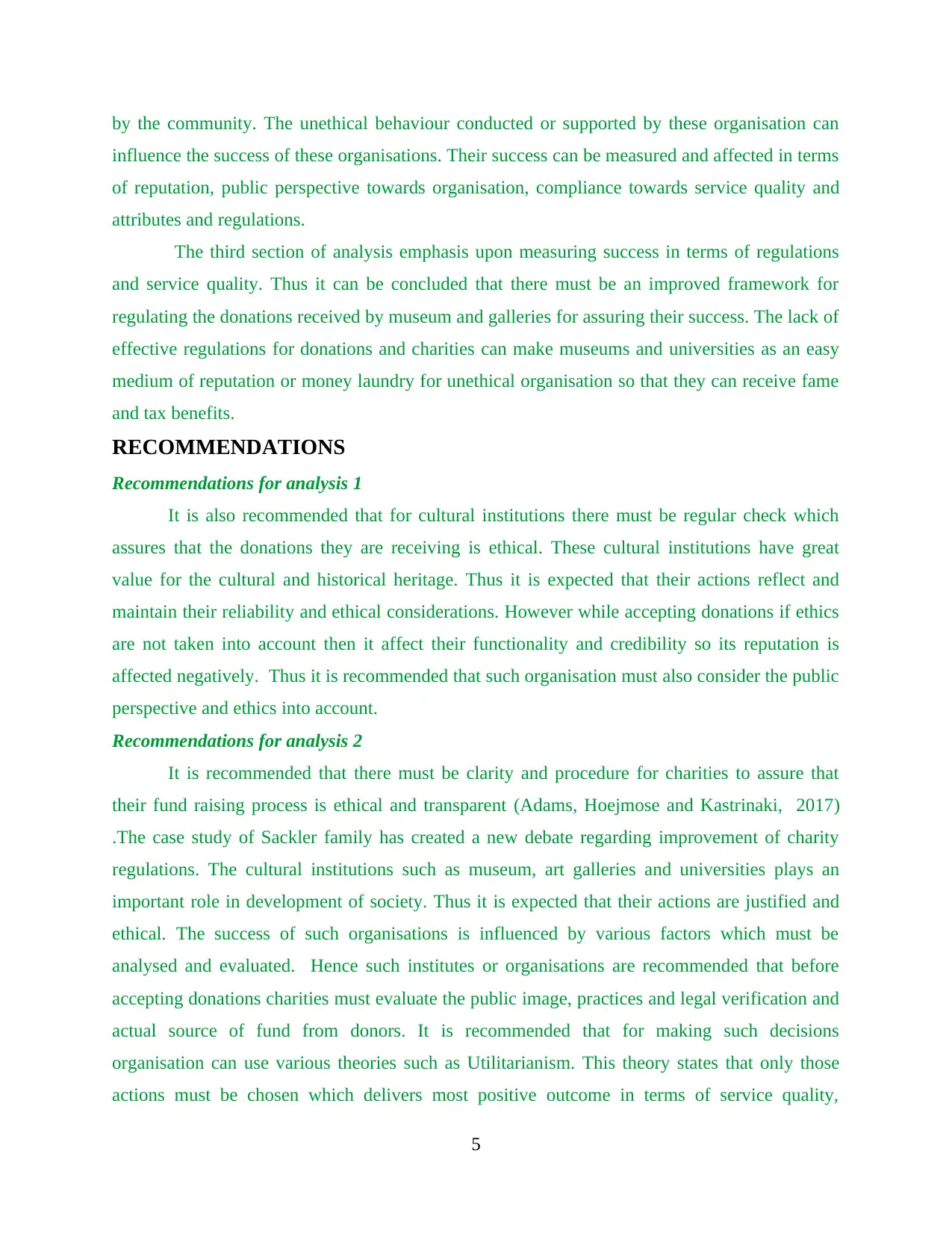
by the community. The unethical behaviour conducted or supported by these organisation can
influence the success of these organisations. Their success can be measured and affected in terms
of reputation, public perspective towards organisation, compliance towards service quality and
attributes and regulations.
The third section of analysis emphasis upon measuring success in terms of regulations
and service quality. Thus it can be concluded that there must be an improved framework for
regulating the donations received by museum and galleries for assuring their success. The lack of
effective regulations for donations and charities can make museums and universities as an easy
medium of reputation or money laundry for unethical organisation so that they can receive fame
and tax benefits.
RECOMMENDATIONS
Recommendations for analysis 1
It is also recommended that for cultural institutions there must be regular check which
assures that the donations they are receiving is ethical. These cultural institutions have great
value for the cultural and historical heritage. Thus it is expected that their actions reflect and
maintain their reliability and ethical considerations. However while accepting donations if ethics
are not taken into account then it affect their functionality and credibility so its reputation is
affected negatively. Thus it is recommended that such organisation must also consider the public
perspective and ethics into account.
Recommendations for analysis 2
It is recommended that there must be clarity and procedure for charities to assure that
their fund raising process is ethical and transparent (Adams, Hoejmose and Kastrinaki, 2017)
.The case study of Sackler family has created a new debate regarding improvement of charity
regulations. The cultural institutions such as museum, art galleries and universities plays an
important role in development of society. Thus it is expected that their actions are justified and
ethical. The success of such organisations is influenced by various factors which must be
analysed and evaluated. Hence such institutes or organisations are recommended that before
accepting donations charities must evaluate the public image, practices and legal verification and
actual source of fund from donors. It is recommended that for making such decisions
organisation can use various theories such as Utilitarianism. This theory states that only those
actions must be chosen which delivers most positive outcome in terms of service quality,
5
influence the success of these organisations. Their success can be measured and affected in terms
of reputation, public perspective towards organisation, compliance towards service quality and
attributes and regulations.
The third section of analysis emphasis upon measuring success in terms of regulations
and service quality. Thus it can be concluded that there must be an improved framework for
regulating the donations received by museum and galleries for assuring their success. The lack of
effective regulations for donations and charities can make museums and universities as an easy
medium of reputation or money laundry for unethical organisation so that they can receive fame
and tax benefits.
RECOMMENDATIONS
Recommendations for analysis 1
It is also recommended that for cultural institutions there must be regular check which
assures that the donations they are receiving is ethical. These cultural institutions have great
value for the cultural and historical heritage. Thus it is expected that their actions reflect and
maintain their reliability and ethical considerations. However while accepting donations if ethics
are not taken into account then it affect their functionality and credibility so its reputation is
affected negatively. Thus it is recommended that such organisation must also consider the public
perspective and ethics into account.
Recommendations for analysis 2
It is recommended that there must be clarity and procedure for charities to assure that
their fund raising process is ethical and transparent (Adams, Hoejmose and Kastrinaki, 2017)
.The case study of Sackler family has created a new debate regarding improvement of charity
regulations. The cultural institutions such as museum, art galleries and universities plays an
important role in development of society. Thus it is expected that their actions are justified and
ethical. The success of such organisations is influenced by various factors which must be
analysed and evaluated. Hence such institutes or organisations are recommended that before
accepting donations charities must evaluate the public image, practices and legal verification and
actual source of fund from donors. It is recommended that for making such decisions
organisation can use various theories such as Utilitarianism. This theory states that only those
actions must be chosen which delivers most positive outcome in terms of service quality,
5
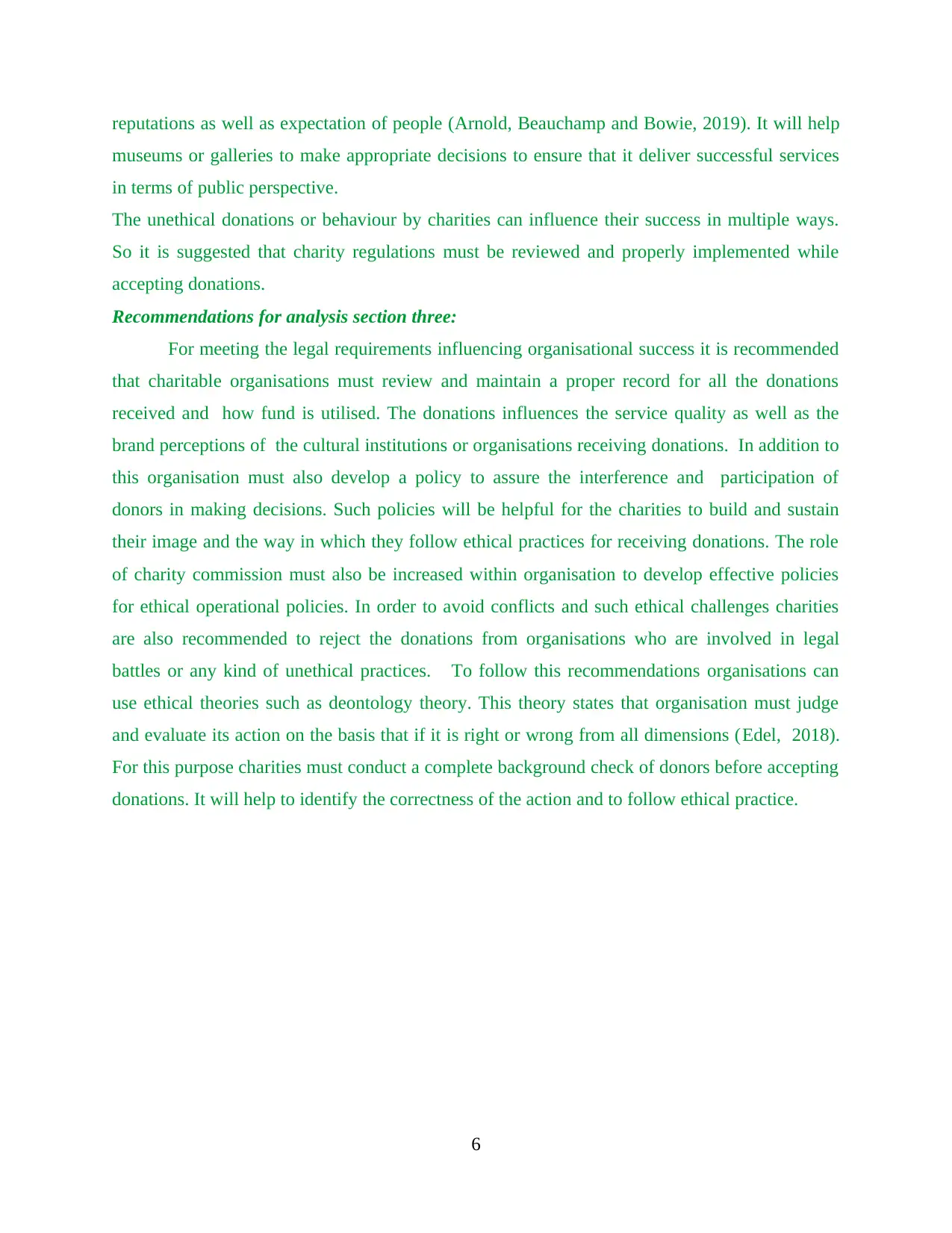
reputations as well as expectation of people (Arnold, Beauchamp and Bowie, 2019). It will help
museums or galleries to make appropriate decisions to ensure that it deliver successful services
in terms of public perspective.
The unethical donations or behaviour by charities can influence their success in multiple ways.
So it is suggested that charity regulations must be reviewed and properly implemented while
accepting donations.
Recommendations for analysis section three:
For meeting the legal requirements influencing organisational success it is recommended
that charitable organisations must review and maintain a proper record for all the donations
received and how fund is utilised. The donations influences the service quality as well as the
brand perceptions of the cultural institutions or organisations receiving donations. In addition to
this organisation must also develop a policy to assure the interference and participation of
donors in making decisions. Such policies will be helpful for the charities to build and sustain
their image and the way in which they follow ethical practices for receiving donations. The role
of charity commission must also be increased within organisation to develop effective policies
for ethical operational policies. In order to avoid conflicts and such ethical challenges charities
are also recommended to reject the donations from organisations who are involved in legal
battles or any kind of unethical practices. To follow this recommendations organisations can
use ethical theories such as deontology theory. This theory states that organisation must judge
and evaluate its action on the basis that if it is right or wrong from all dimensions (Edel, 2018).
For this purpose charities must conduct a complete background check of donors before accepting
donations. It will help to identify the correctness of the action and to follow ethical practice.
6
museums or galleries to make appropriate decisions to ensure that it deliver successful services
in terms of public perspective.
The unethical donations or behaviour by charities can influence their success in multiple ways.
So it is suggested that charity regulations must be reviewed and properly implemented while
accepting donations.
Recommendations for analysis section three:
For meeting the legal requirements influencing organisational success it is recommended
that charitable organisations must review and maintain a proper record for all the donations
received and how fund is utilised. The donations influences the service quality as well as the
brand perceptions of the cultural institutions or organisations receiving donations. In addition to
this organisation must also develop a policy to assure the interference and participation of
donors in making decisions. Such policies will be helpful for the charities to build and sustain
their image and the way in which they follow ethical practices for receiving donations. The role
of charity commission must also be increased within organisation to develop effective policies
for ethical operational policies. In order to avoid conflicts and such ethical challenges charities
are also recommended to reject the donations from organisations who are involved in legal
battles or any kind of unethical practices. To follow this recommendations organisations can
use ethical theories such as deontology theory. This theory states that organisation must judge
and evaluate its action on the basis that if it is right or wrong from all dimensions (Edel, 2018).
For this purpose charities must conduct a complete background check of donors before accepting
donations. It will help to identify the correctness of the action and to follow ethical practice.
6
⊘ This is a preview!⊘
Do you want full access?
Subscribe today to unlock all pages.

Trusted by 1+ million students worldwide
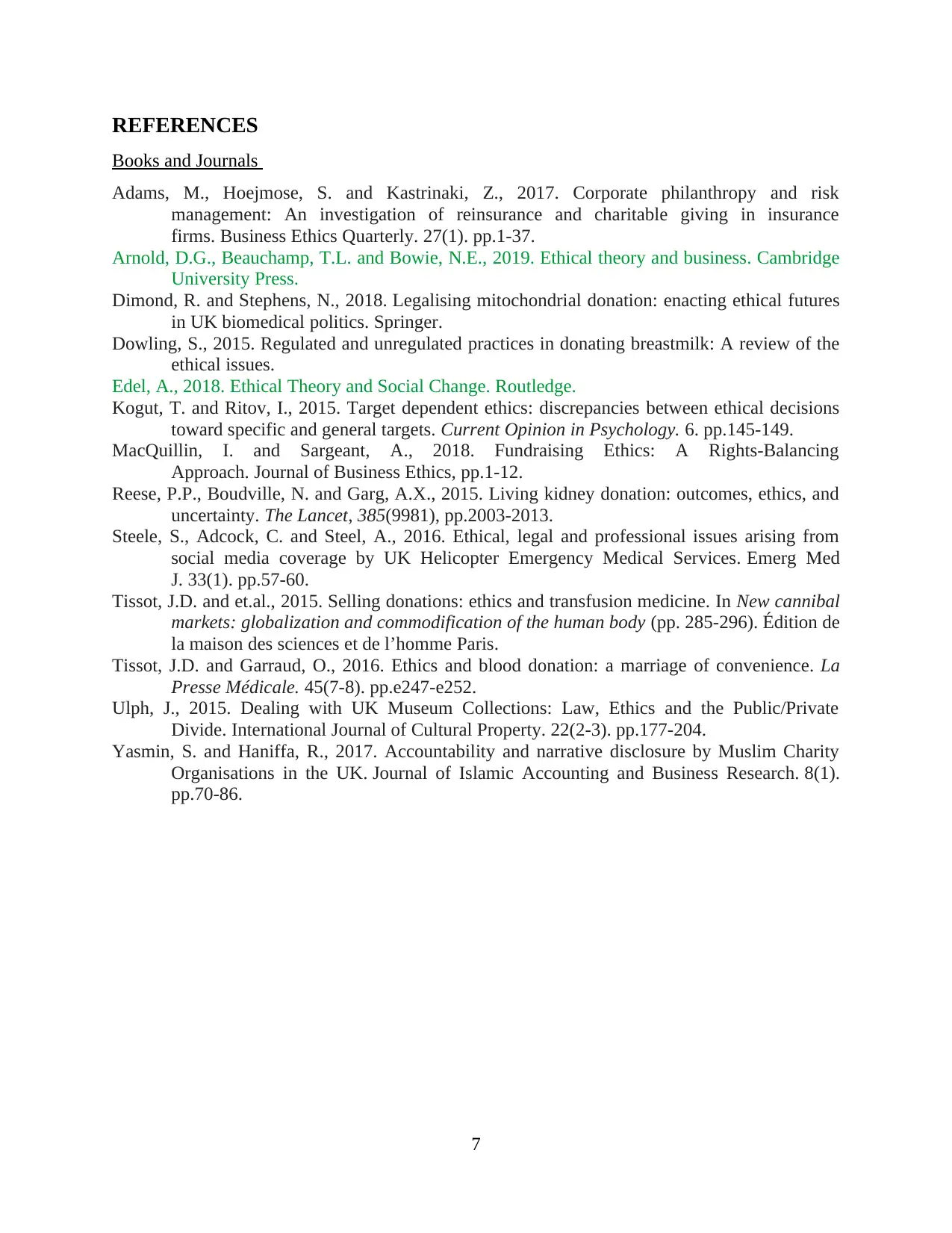
REFERENCES
Books and Journals
Adams, M., Hoejmose, S. and Kastrinaki, Z., 2017. Corporate philanthropy and risk
management: An investigation of reinsurance and charitable giving in insurance
firms. Business Ethics Quarterly. 27(1). pp.1-37.
Arnold, D.G., Beauchamp, T.L. and Bowie, N.E., 2019. Ethical theory and business. Cambridge
University Press.
Dimond, R. and Stephens, N., 2018. Legalising mitochondrial donation: enacting ethical futures
in UK biomedical politics. Springer.
Dowling, S., 2015. Regulated and unregulated practices in donating breastmilk: A review of the
ethical issues.
Edel, A., 2018. Ethical Theory and Social Change. Routledge.
Kogut, T. and Ritov, I., 2015. Target dependent ethics: discrepancies between ethical decisions
toward specific and general targets. Current Opinion in Psychology. 6. pp.145-149.
MacQuillin, I. and Sargeant, A., 2018. Fundraising Ethics: A Rights-Balancing
Approach. Journal of Business Ethics, pp.1-12.
Reese, P.P., Boudville, N. and Garg, A.X., 2015. Living kidney donation: outcomes, ethics, and
uncertainty. The Lancet, 385(9981), pp.2003-2013.
Steele, S., Adcock, C. and Steel, A., 2016. Ethical, legal and professional issues arising from
social media coverage by UK Helicopter Emergency Medical Services. Emerg Med
J. 33(1). pp.57-60.
Tissot, J.D. and et.al., 2015. Selling donations: ethics and transfusion medicine. In New cannibal
markets: globalization and commodification of the human body (pp. 285-296). Édition de
la maison des sciences et de l’homme Paris.
Tissot, J.D. and Garraud, O., 2016. Ethics and blood donation: a marriage of convenience. La
Presse Médicale. 45(7-8). pp.e247-e252.
Ulph, J., 2015. Dealing with UK Museum Collections: Law, Ethics and the Public/Private
Divide. International Journal of Cultural Property. 22(2-3). pp.177-204.
Yasmin, S. and Haniffa, R., 2017. Accountability and narrative disclosure by Muslim Charity
Organisations in the UK. Journal of Islamic Accounting and Business Research. 8(1).
pp.70-86.
7
Books and Journals
Adams, M., Hoejmose, S. and Kastrinaki, Z., 2017. Corporate philanthropy and risk
management: An investigation of reinsurance and charitable giving in insurance
firms. Business Ethics Quarterly. 27(1). pp.1-37.
Arnold, D.G., Beauchamp, T.L. and Bowie, N.E., 2019. Ethical theory and business. Cambridge
University Press.
Dimond, R. and Stephens, N., 2018. Legalising mitochondrial donation: enacting ethical futures
in UK biomedical politics. Springer.
Dowling, S., 2015. Regulated and unregulated practices in donating breastmilk: A review of the
ethical issues.
Edel, A., 2018. Ethical Theory and Social Change. Routledge.
Kogut, T. and Ritov, I., 2015. Target dependent ethics: discrepancies between ethical decisions
toward specific and general targets. Current Opinion in Psychology. 6. pp.145-149.
MacQuillin, I. and Sargeant, A., 2018. Fundraising Ethics: A Rights-Balancing
Approach. Journal of Business Ethics, pp.1-12.
Reese, P.P., Boudville, N. and Garg, A.X., 2015. Living kidney donation: outcomes, ethics, and
uncertainty. The Lancet, 385(9981), pp.2003-2013.
Steele, S., Adcock, C. and Steel, A., 2016. Ethical, legal and professional issues arising from
social media coverage by UK Helicopter Emergency Medical Services. Emerg Med
J. 33(1). pp.57-60.
Tissot, J.D. and et.al., 2015. Selling donations: ethics and transfusion medicine. In New cannibal
markets: globalization and commodification of the human body (pp. 285-296). Édition de
la maison des sciences et de l’homme Paris.
Tissot, J.D. and Garraud, O., 2016. Ethics and blood donation: a marriage of convenience. La
Presse Médicale. 45(7-8). pp.e247-e252.
Ulph, J., 2015. Dealing with UK Museum Collections: Law, Ethics and the Public/Private
Divide. International Journal of Cultural Property. 22(2-3). pp.177-204.
Yasmin, S. and Haniffa, R., 2017. Accountability and narrative disclosure by Muslim Charity
Organisations in the UK. Journal of Islamic Accounting and Business Research. 8(1).
pp.70-86.
7
Paraphrase This Document
Need a fresh take? Get an instant paraphrase of this document with our AI Paraphraser

8

9
⊘ This is a preview!⊘
Do you want full access?
Subscribe today to unlock all pages.

Trusted by 1+ million students worldwide
1 out of 14
Related Documents
Your All-in-One AI-Powered Toolkit for Academic Success.
+13062052269
info@desklib.com
Available 24*7 on WhatsApp / Email
![[object Object]](/_next/static/media/star-bottom.7253800d.svg)
Unlock your academic potential
Copyright © 2020–2026 A2Z Services. All Rights Reserved. Developed and managed by ZUCOL.





